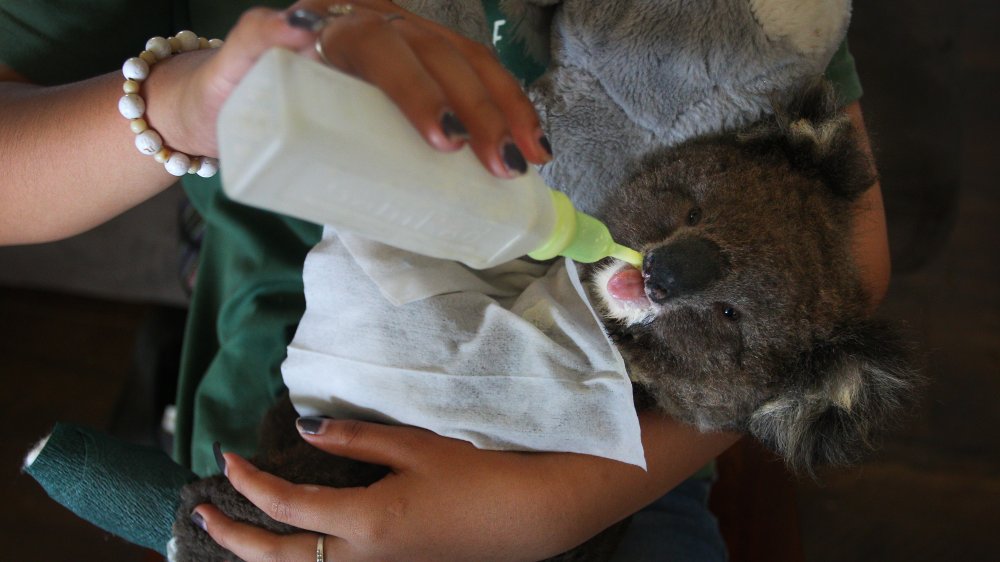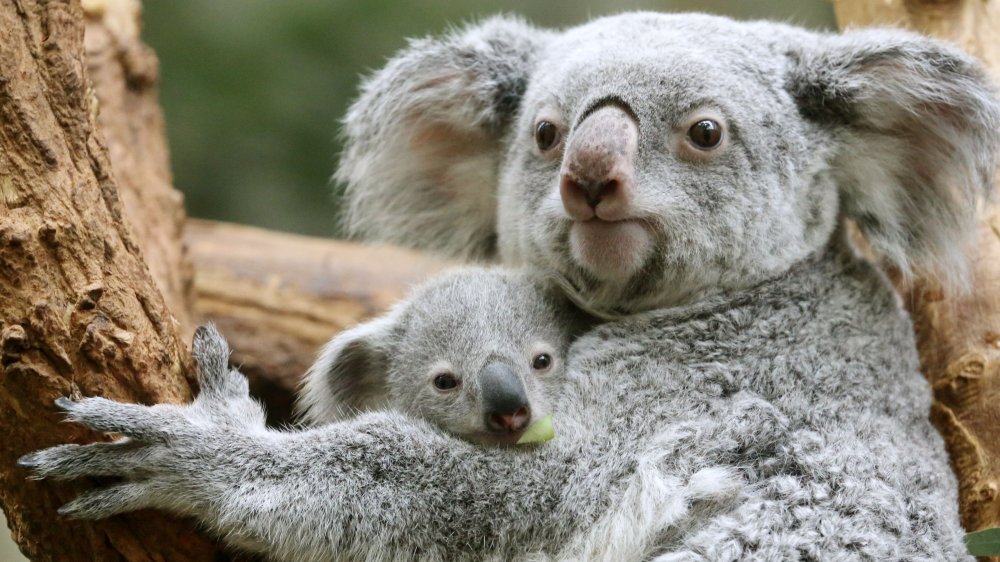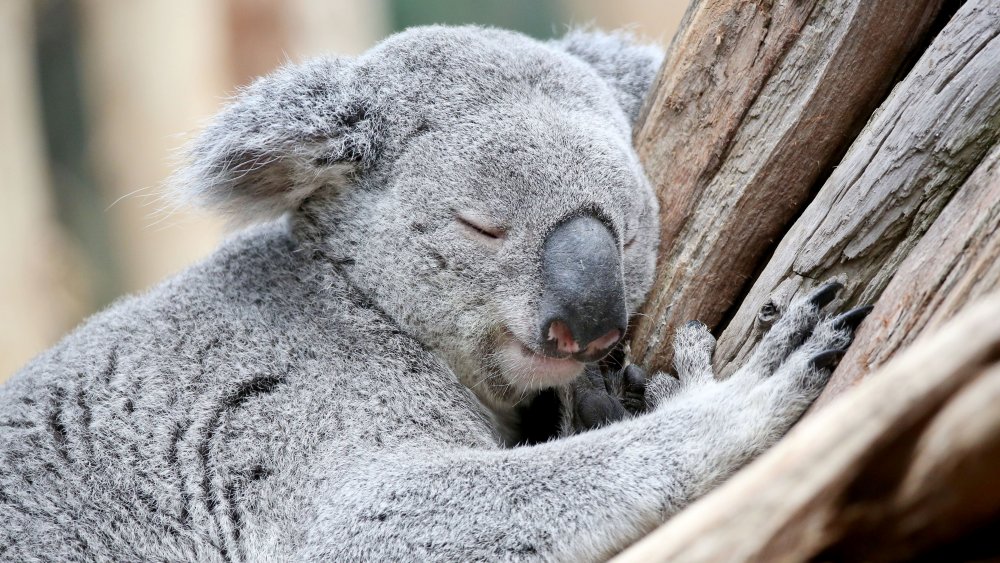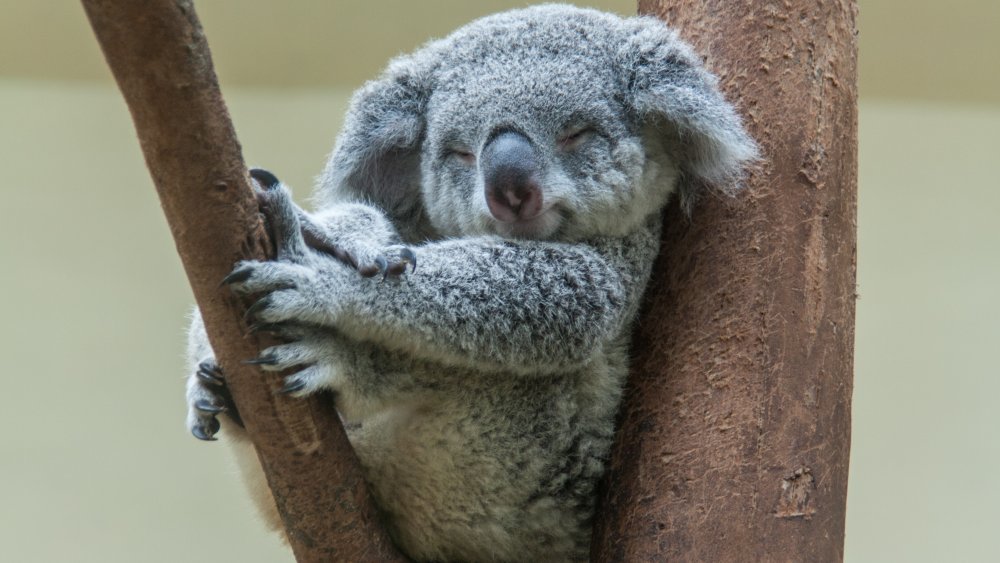How Long Do Koalas Really Sleep In A Day?
The koala is a prime example of what biologists refer to as "evolutionary dumb-dumbery." They look like bears, but they're not bears. They won't stop getting chlamydia. They have naturally occuring Muppet noses. Their thumbs are pure body horror and they smell the same as your college roommate who read one time that rubbing tea tree oil on yourself is just as good as showering.
And yet, against all odds, they persist, continuing to exist in staggering numbers. From the branch of seemingly every tree in the outback, they stare down at you with death in their eyes and hate in their souls.
Or at least they would, if they weren't so gosh dang drowsy.
Just another brick in koala
Your standard koala, it turns out, spends between 18 and 22 hours a day drifting off to dreamland, according to the Australian Koala Foundation. Scientists have long believed that this may be due to their position as nature's own teddy bear, but recent studies point to a more biologically sound explanation.
The koala, as you probably know, subsists strictly on eucalyptus. What you might not know is that eucalyptus is highly toxic, low on calories, and difficult to digest. While the plants are poisonous to most mammals, koalas have developed specialized digestive bacteria that nullifies the venomous effects. There's a common misconception that the process gets the wee marsupials like, wicked stoned, but in reality? Koalas are straight edge. Their bodies are temples. Temples stuffed full of smelly leaves. They don't need to get high. Life is their drug.
An upshot to the all-eucalyptus diet, which we can only assume Gwyneth Paltrow will be selling in subscription box form sometime in early 2021, is that it provides these down under Teddy Ruxpins with all the hydration they need. Koalas are so rarely seen sipping from natural water sources that their name is thought to mean "never drink" in an Aboriginal language.
Like most vegetarians, koalas struggle to get enough nutrients and have to spend most of their waking hours eating leaf after leaf, pretending that this is fine, this is all just fine. The rest of their time is spent conserving energy by taking the shuttle to snooze town. By National Geographic's reckoning, this makes them more ambitious nappers than sloths, which top out at 20 hours of R&R.
And ko-while we're at it
While riding the train to Sleepytown, koalas use their shapely, sumptuous curves to their advantage. With their pear-shaped bodies, they're able to easily anchor themselves in the forks of tree branches, often latching on with their honestly-pretty-disturbing number of thumbs. Once you move past the perfectly natural fear of having one grab your face and never let go, the whole thing is actually kind of adorable.
Koalas aren't the only creatures whose picky eating habits lead to a generous helping of siestas. The Giant Panda, which is, and this is true, so dumb, is biologically capable of consuming meat. Heck, they probably should eat meat, given their digestive systems and their gargantuan nightmare teeth. But because nobody ever tells them "no," they spend as much of their lives as they can chowing down on low-calorie, farm-to-table bamboo. Despite shoving twenty to forty pounds of the stuff down their gullets on the daily, they don't get a whole lot of energy because they're eating wood. As a result, they spend half of their day asleep, and the other half trying to find more splinters to nosh.
Koala heads prevail
Science Focus lists a few other creatures that spend most of their days in the gentle embrace of Morpheus. The brown bat has been observed sleeping for about twenty hours in a solar cycle. The fifth heaviest sleeper on the list is the North American possum at 18 hours a day, although there's a chance that it's faking. Listed at number 8 is the human baby, described as sleeping for 16 hours a day in a statistic that will have new parents laughing and laughing and weeping uncontrollably and then laughing some more.
At the opposite end of the spectrum, according to Sleep.org, giraffes only need about two hours of sleep per day, often split up into several micro-naps, and walruses can go three and a half days without resting their eyes.
Also, did you know that koalas have fingerprints? Individual fingerprints, just like human beings. They're the only non-primates that have those. On a related note, recent studies show that koala fingerprints were on the knife at the crime scene, they're in your house, and you need to get out. Get out now!



